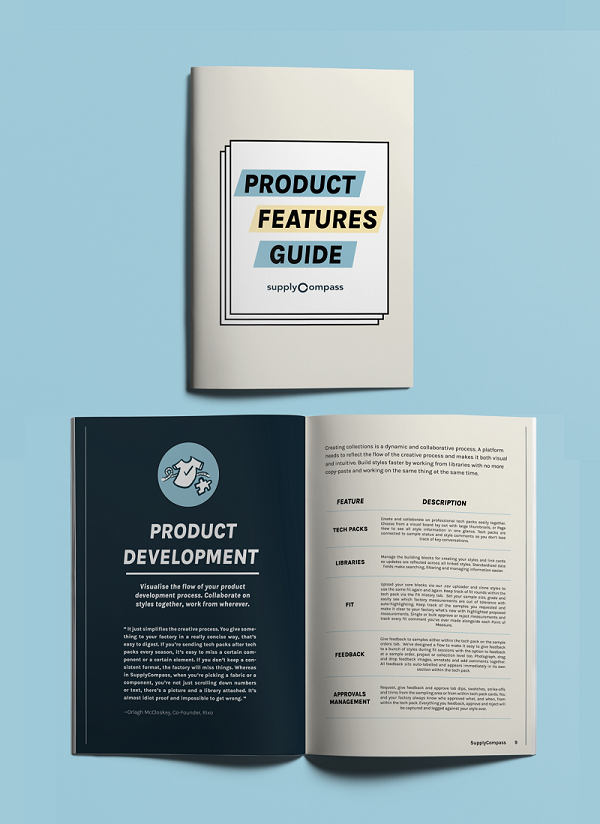Sustainable Fashion Guides
SupplyCompass is a product development and production management platform that enables fashion brands and manufacturers to produce better, together. Our sustainable fashion guides cover certifications and materials, and gather expertise from leading industry bodies and standards, fashion brands, designers, strategists and thought leaders. They are perfect for fast-growing fashion brands wanting to create more sustainable and innovative collections.
Filters
ALL GUIDES
SUSTAINABLE MATERIALS
SUPPLY CHAIN
CERTIFICATIONS & STANDARDS
ALL GUIDES
Sustainable Material Guide:
Cotton
Everything you need to know about cotton: key material properties, the difference between conventional and organic, and how to design a collection with this coveted
material.


Sustainable Material Guide:
Leather
Not all leather is equal in price, quality, texture or use. This guide will take you through the key considerations when designing a collection with leather; including the full leather supply chain process and exploring the different types of leather available.
Sustainable Material Guide:
Leather Alternatives
Companies and consumers are fast becoming more open to leather alternatives with the rise of environmental and societal concerns, as well as animal welfare. Including an overview on PU, fish skin, recycled, coconut, apple, pineapple, mushroom, cork, cactus and wine leather – we’ve got you covered.


Sustainable Material Guide:
Polyester
Our latest guide explores the rPET process, the environmental impact of polyester, the difference between virgin and recycled, and what to consider when designing a collection with polyester.
Sustainable Material Guide:
Viscose
Viscose is a man-made cellulosic fibre and the third most commonly used in the world. Often seen as a vegan alternative to silk due to its properties, viscose can have Learn more about what to consider while developing a collection with viscose.


Sustainable Material Guide:
Wool
In partnership with The Woolmark Company
We’ve joined forces to develop a comprehensive guide to cover everything you need to know about wool. We also highlight the considerations for designing a collection with wool, the environmental, animal and social impacts, The Woolmark Company’s certification, and the latest


Logistics for Fashion Guide
In partnership with Flexport
Fashion supply chains are incredibly complex and usually spread across continents. Ensuring the right quantities are ordered, accounting for time, unforeseeable delays and for sustainability can make the world of logistics difficult to navigate. By explaining the most common terms and exploring key factors to be aware of, this is an essential guide for fashion brands looking to better understand the complexities of moving goods around the world.
Certifications & Standards Guide
We have rounded up the top fashion industry supply chain certifications and standards, including leading audits, to help guide you through the sustainable production landscape. These include those that cover fair labor practices, social concerns, animal welfare and environmental impact.

SUSTAINABLE MATERIALS
Sustainable Material Guide:
Cotton
Everything you need to know about cotton: key material properties, the difference between conventional and organic, and how to design a collection with this coveted
material.


Sustainable Material Guide:
Leather
Not all leather is equal in price, quality, texture or use. This guide will take you through the key considerations when designing a collection with leather; including the full leather supply chain process and exploring the different types of leather available.
Sustainable Material Guide:
Leather Alternatives
Companies and consumers are fast becoming more open to leather alternatives with the rise of environmental and societal concerns, as well as animal welfare. Including an overview on PU, fish skin, recycled, coconut, apple, pineapple, mushroom, cork, cactus and wine leather – we’ve got you covered.


Sustainable Material Guide:
Polyester
Our latest guide explores the rPET process, the environmental impact of polyester, the difference between virgin and recycled, and what to consider when designing a collection with polyester.
Sustainable Material Guide:
Viscose
Viscose is a man-made cellulosic fibre and the third most commonly used in the world. Often seen as a vegan alternative to silk due to its properties, viscose can have Learn more about what to consider while developing a collection with viscose.


Sustainable Material Guide:
Wool
In partnership with The Woolmark Company
We’ve joined forces to develop a comprehensive guide to cover everything you need to know about wool. We also highlight the considerations for designing a collection with wool, the environmental, animal and social impacts, The Woolmark Company’s certification, and the latest

SUPPLY CHAIN

Logistics for Fashion Guide
In partnership with Flexport
Fashion supply chains are incredibly complex and usually spread across continents. Ensuring the right quantities are ordered, accounting for time, unforeseeable delays and for sustainability can make the world of logistics difficult to navigate. By explaining the most common terms and exploring key factors to be aware of, this is an essential guide for fashion brands looking to better understand the complexities of moving goods around the world.
CERTIFICATIONS & STANDARDS

Certifications & Standards Guide
We have rounded up the top fashion industry supply chain certifications and standards, including leading audits, to help guide you through the sustainable production landscape. These include those that cover fair labor practices, social concerns, animal welfare and environmental impact.

Now take a look at our Product Guide.
If you’re still having doubts, our Product Features Guide has got you sorted. We break down all our features and sub-features, explaining how you can use them and what makes them tick, so you can understand how SupplyCompass can help SMEs like you.